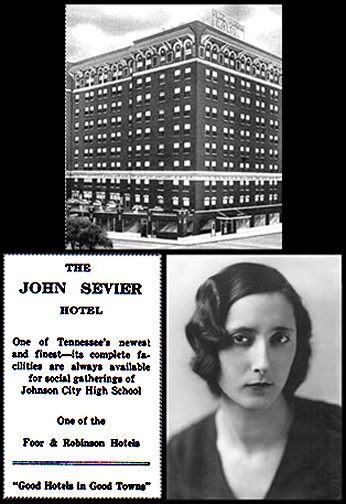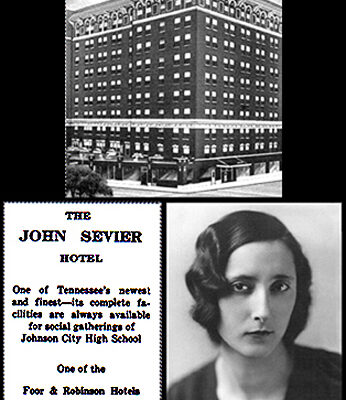Local historian Alan Bridwell interviewed Stella Lent who fondly recalled the years she lived in Johnson City and her love for working at the John Sevier Hotel.
The 99-year-old resident was born in 1911, the same year as the Titanic tragedy. She and her family arrived in Johnson City in 1928 by train from Beckley, West Virginia and rented a furnished house on Whitney Street from Dr. Carroll Long. Ms. Lent later worked at People’s Drug on Main Street for several years.
Between 1943 and 1963, she was employed at the John Sevier Hotel. She spoke highly of Harry Lee Faw (on whose land the hotel was built) and his wife, Katherine. The old Faw home place later became a boarding house before being demolished to make room for the hotel.

Initial plans were to construct the hotel in three phases beginning on the north (Southern Depot) side and finishing at the south (Market Street) end. The first phase containing 130 rooms was constructed in 1924. The second phase that added 100 additional rooms was under construction when the Lent family arrived in the city. The third addition was never built. Entrances to the long lobby were on Market Street (south), Roan Street (east) and Fonde Circle (north).
Initially, the hotel rooms were very basic with no frills such as radios, televisions or air conditioning. Stella recalled that room rates were varied: $2.50, $3.00, $5.00 and $8.50 per day. Each had a private bathroom with small tiles on the floor.
Guests had access to a separately owned 110-car parking garage along the west side of the hotel owned by a Mr. Fields. Although there were no covered walkways interconnecting the hotel, train station or garage, passengers could exit the train and be within a short walking distance of the hotel. Bellhops known as “red hats” patrolled the area between the hotel, garage and train station to assist travelers with their luggage.
Ms. Lent recalled that Eleanor Roosevelt lodged at the hotel on three separate occasions, always arriving by train. She conversed with the First Lady on each visit. During one trip, she and her sister went to Soldiers Home and chatted with the special guest about the subject of infantile paralysis, which had infected the president and Stella’s sister.
When Stella was asked if she heard any stories about Al Capone staying at the hotel, she responded with a strong, “Oh yes!” She based her information on comments related to her from a reliable bellboy who was working there when the gangster and his entourage arrived in 1927. He told her that they rented the entire third floor. They were always very polite, caused no trouble during their stay and left the rooms in the same clean and orderly condition as when they arrived. Stella remembered when the city was called Little Chicago. Downtown merchants often utilized a “door shaker,” a police officer who walked the streets after hours checking each business establishment’s door to ensure it was properly secured.
The old Faw Spring, which had previously been a favorite resting stop for travelers and their horses in the early days of the city, became an aggravation for the hotel after it was built because water had to be continually pumped out of the basement sump. Occasionally, a pump malfunctioned, causing water to flood the basement. Stella said the water would sometimes be ankle-deep in her first floor office.
It was standard procedure for people to make reservations before arriving at the hotel. Sometimes, patrons would stop in for a room only to find that there were none available. The hotel stayed full throughout the war years. Rooms were held until 11 p.m. after which time they were removed from reservation, unless the arrival time was confirmed with the reservation desk clerk.
A humorous incident once occurred concerning room 1820, which had three single beds in it. A man showed up at the desk and requested a room. Since the people reserving it had not arrived yet and it was approaching 11 p.m., the man repeatedly demanded that he be given the room. When Stella refused, he threatened to call his good friend, Judge Samuel Cole Williams to influence her to give him a room. Stella responded, “When you call him, let me speak to him because he is deceased.” That abruptly ended the argument.
Ms. Lent said that the hotel strived to maintain a good reputation by strictly forbidding gambling, prostitution and drunkenness. If hotel management suspected questionable behavior in a room, they checked it out. Sometimes a fight broke out prompting a call for the police to restore order. The hotel maintained a “black list” of people who were not permitted to stay at the hotel because of previous problems She said some well-known residents were on the list.
Stella loved to work on the hotel’s switchboard, which she deemed was a “great experience.” It consisted of a two position Kellogg board with two rows of jacks directly opposite each other. “When a signal came on,” she said, “the operator could answer on either set, but the rule of thumb was to use the back jack for all guests requesting an outside call. We stayed busy when we worked the switchboard. We had three telephone booths; one was the house phone and the other two were pay phones. Somebody would come up and ask me to ring someone’s room, but we were not permitted to pass along calls from people walking in off the street.”
Despite her age, Stella Lent’s sharp memory and quick wit provided added interesting facts about a once prominent “skyscraper” in downtown Johnson City.
